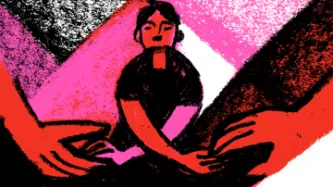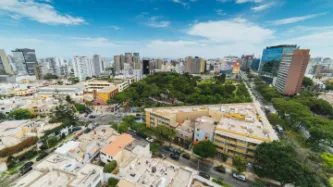Search
Content type: Video
You can listen and subscribe to the podcast where ever you normally find your podcasts:
Spotify
Apple podcasts
Google podcasts
Castbox
Overcast
Pocket Casts
Peertube
Youtube
Stitcher
And more...
And support PI's work here: support.privacyinternational.org
Content type: Examples
Corruption scandals have added to Latin America’s challenges in dealing with the coronavirus. In Ecuador, prosecutors identified a criminal ring that colluded with health officials to sell body bags to hospitals at 13 times the normal price, and many others are accused of price-gouging for other medical supplies.
The former Bolivian health minister is under house arrest awaiting trial on corruption charges, government officials in seven Brazilian states are under investigation for misusing…
Content type: Examples
When Google and Apple announced their joint platform for contact tracing, the companies said the system would not track users’ locations. By mid-July, the resulting apps had been downloaded more than 20 million times in companies such as Germany and Switzerland. However, in order for Bluetooth, which the app requires, to work on Android phones, users must enable location services, with the result that Google may be able to track their location. Governments and health officials in Germany,…
Content type: Case Study
The Peruvian government has a history of collaboration with the private sector in developing technology with the alleged purpose of providing greater security to citizens. The most recent example, the smartphone application "Peru En Tus Manos" launched in the context of the Covid-19 crisis, has been developed in a similar fashion and currently collects geolocation data on more than a million users. Although Peru has a proper legal framework for public private partnerships, developments are…
Content type: Examples
Many of the technologies used to combat the coronavirus pandemic, including monitoring and analysing social media posts, telecommunications location data, and the use of sensors, were first tested on refugees during the 2015 crisis and are now being repurposed in the name of public health. In 2019, the European border security agency Frontex published a €400,000 tender for social media analysis services hoping to better predict future migration patterns; the tender was withdrawn after an…
Content type: Examples
It's been two months since the launch of "Perú en us manos", the mobile app promoted by the Peruvian government amidst the Covid-19 pandemic. Until now the app did not accomplish the ambitious goals it set out to.
On its first month the app had detected 1400 risk zones while there where already 36,000 confirmed infection cases. There is little transparency on how those risk zones are estimated. Developers of the app state that only one fifth of the data provided by the Health Ministry is clean…
Content type: Examples
Our partners from Hiperderecho in Peru proposed 15 measures to improve the COVID-19 app that the Peruvian Government is rolling out in the country (in Spanish).
Link: https://hiperderecho.org/2020/04/quince-propuestas-para-mejorar-la-aplicacion-del-gobierno-del-covid-19/
Content type: Examples
Liechtenstein is the first European country to use biometric electronic bracelets to implement a real time coronavirus tracking programme. The bracelet, which sends skin temperature, breathing, and pulse, among other metrics, for analysis in a Swiss lab, is being offered to 5% of the population. The country, which acted early to prevent the epidemic, plans to roll the bracelets out to the entire population by autumn.
Source: https://inews.co.uk/news/health/coronavirus-testing-latest-…
Content type: Examples
Eight days after instituting a gender-based quarantine schedule, Peruvian president Martin Vizcarra cancelled the measure two days before it was due to end. It had been met with a backlash from LGBTQ+ activists, who feared trans and binary people would face increasing street harassment from police. However, it also proved that because women do a disproportionate share of domestic work, gender separation forced them to gather in large groups on the days they were allowed out. Instead…
Content type: Examples
On April 2 Peruvian president Martín Vizcarra issued a controversial rule that men and women must observe quarantine on different days: men may leave their homes on Mondays, Wednesdays, and Fridays, while women may leave only on Tuesdays, Thursdays, and Saturdays. No one is allowed out on Sundays. Some critics are concerned that the plan will lead to disproportionate harassment of LGBTQ+ people because the police are instructed to stop people based on gender presentation. The purpose, the…
Content type: Examples
GDPRHub is collecting a list of projects around the world that are using personal data to combat the novel coronavirus. The list is divided into categories such as decentralised contact tracing apps and frameworks; centralised contact tracing systems; lockdown enforcement; self-assessment apps; mapping projects; and statistical analysis. The site also tracks COVID-19-releated data protection issues.
Source: https://gdprhub.eu/index.php?title=Projects_using_personal_data_to_combat_SARS-…
Content type: Examples
Led by Germany's Fraunhofer Heinrich Hertz Institute for Telecoms, technologists and scientists from at least eight countries, are working on a proximity-based contact tracing technology that complies with GDPR. The Pan-European Privacy-Preserving Proximity Tracing project (PEPP-PT) is intended to leverage smartphones to help disrupt the spread of infection by notifying individuals when their smartphones are near enough to to that of another person to carry out a Bluetooth handshake - thereby…
Content type: Examples
On March 20, the Peruvian government introduced a website where citizens can retrieve the results of tests for COVID-19. The site asks only for the patient to fill in their National ID number and a simple captcha, making it easy for unauthorised parties to access others' results and put people at risk of exploitation and discrimination.
Source: https://saludconlupa.com/noticias/peru-debilidades-de-plataforma-del-ministerio-de-salud-pueden-exponer-informacion-clinica-de-pacientes-covid-19…
Content type: Examples
On March 19, the Peruvian government instituted a daily curfew from 8pm to 5am, which applies to all but those working to provide essential services. Members of the print and broadcast press must carry their special permits, badges, and ID cards, and those requiring urgent medical care are allowed to travel. Private citizens are no longer allowed to drive their own cars at any time except where necessary for the above groups. The law is being enforced by the police and armed forces.
Sources:…
Content type: Examples
On March 17, after declaring a state of emergency an ordering everyone to stay at home, the Peruvian government began requiring a special authorisation for street travel. Workers in a the categories specified in Article 4 of the Supreme Decree must obtain the authorisation via a government website. The authorisation process involves cross-referencing with other personal databases to check the accuracy and validity of each application.
Source: https://andina.pe/ingles/noticia-peru-key-…
Content type: Examples
On March 14, the Peruvian government set up a website for individuals to check their symptoms so they can be directed towards sources of help. The web form asks for ID number, phone, email and home address.
Source: https://www.gob.pe/coronavirus
Writer: Peruvian government
Publication: Peruvian government
Content type: Examples
Under a new protocol, international passengers arriving at Lime's Jorge Chavez International Airport or by ship at Callao Port, is referred to medical staff if they are arriving from places with confirmed cases, even if they are asymptomatic. Passengers who show symptoms in transit are transferred to isolation areas, where they receive care. The passengers are also required to supply personal information so they can be surveilled over the following days.
Source: https://andina.pe/ingles/…
Content type: Examples
Peru has suspended constitutional rights such as freedom of movement and assembly, although the government has guaranteed the operation of supermarkets, pharmacies, banks, basic services, and the transportation of merchandise.
Source: https://www.reuters.com/article/us-health-coronavirus-latam-idUSKBN2133BY

